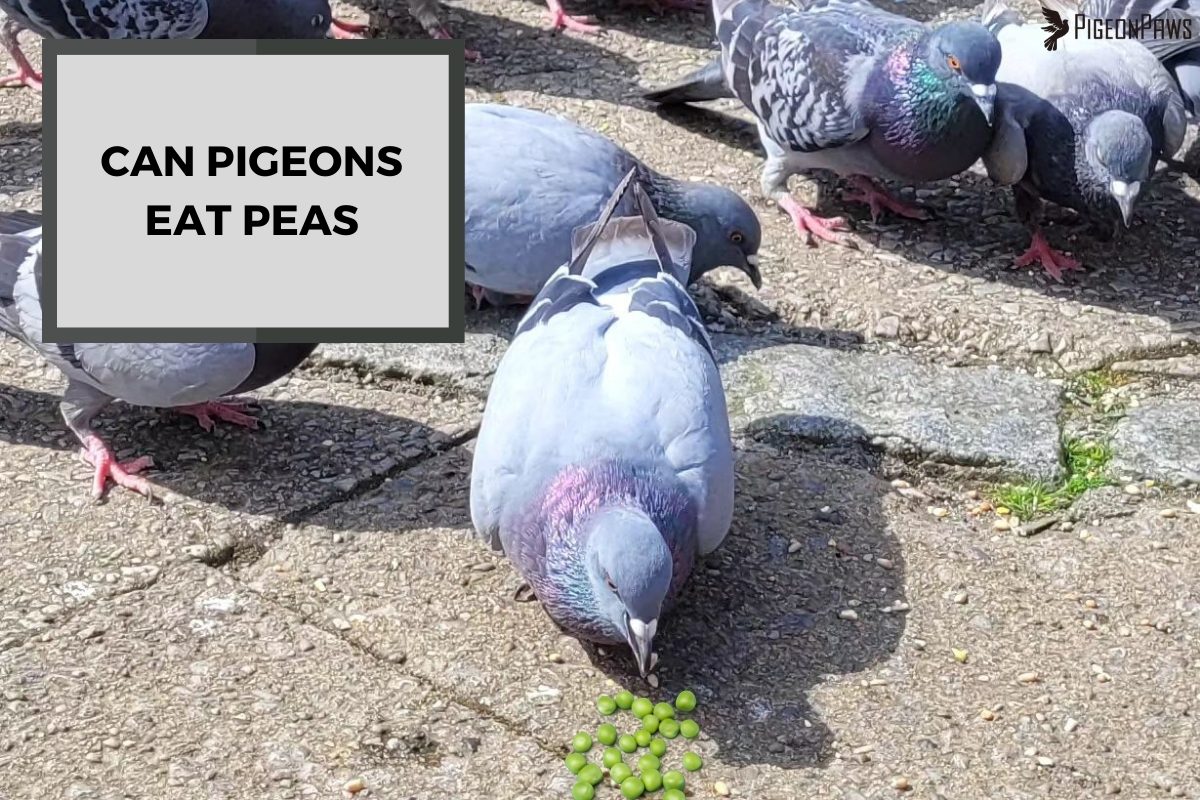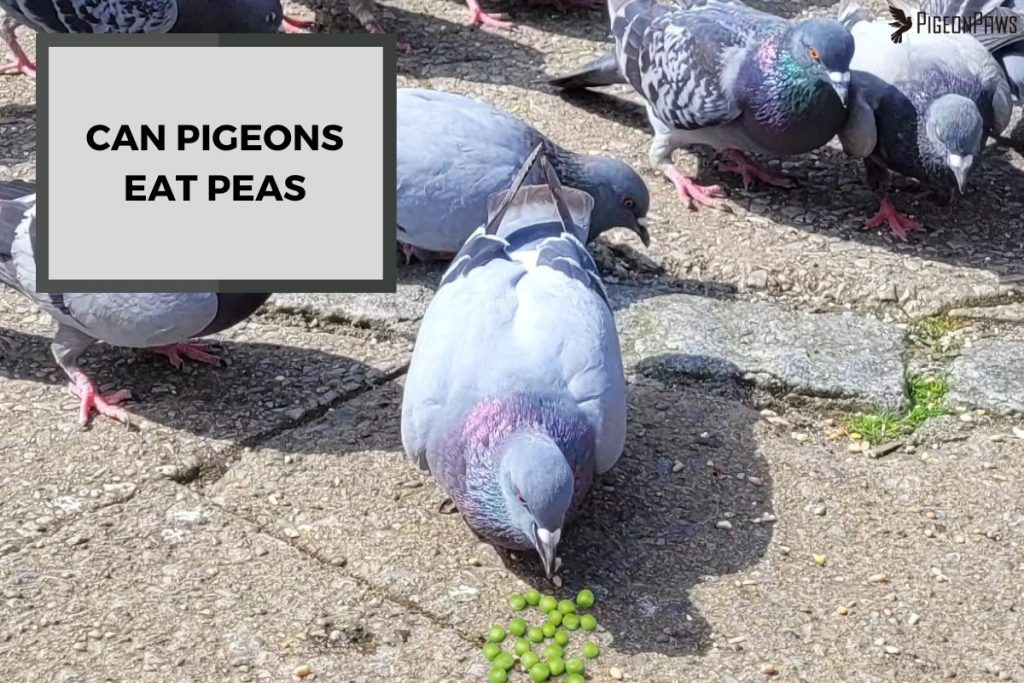Can Pigeons Eat Peas? Pea-Based Diet!

are also fascinating creatures with unique behaviors and dietary needs. In recent years, there has been a growing interest in feeding pigeons a healthy and sustainable diet. One such diet that has gained popularity is the pea-based diet.
Pigeons can eat peas and even benefit from them. Peas are a highly efficacious source of fundamental nutrients, including protein, fiber, and vitamins, that can significantly contribute to the maintenance of optimal health and vigor for pigeons.
Just remember to feed them in moderation and take precautions to avoid potential risks.
In the following discourse, I shall expound upon the advantages of integrating peas into the diet of pigeons, diverse techniques for administering the peas, recommended quantities for distribution, and potential hazards associated with this practice. So, let’s dive in!

What Are The Benefits of Feeding Peas to Pigeons?
Urban areas often have a significant presence of pigeons, and feeding them can be gratifying and enjoyable. One nutritious food that you may want to consider feeding them is peas. Peas are a rich source of nutrients that can provide several benefits to pigeons. Here are some of the key benefits of feeding peas to pigeons:
Improved Digestion
Peas are rich in fiber, which can help improve the digestion of pigeons. It helps regulate the digestive system by promoting the growth of beneficial gut bacteria, which can break down food and promote nutrient absorption. You can help prevent digestive issues such as constipation, diarrhea, and bloating by feeding them peas.
Enhanced Immune System
Peas are regarded as a valuable reservoir of essential nutrients such as vitamins K, C, and potassium and a remarkable fiber source. These nutrients can lower inflammation, aid in healing, and help avoid infections—all crucial for maintaining overall health.
Increased Energy
Pigeons need plenty of energy to fly, mate, and forage for food. Peas are a nutrient-dense food containing protein and carbohydrates, which confer a dynamic energy source to pigeons, allowing them to execute their tasks efficiently.
Protein is particularly important for building and repairing tissues, while carbohydrates are a good energy source.
Healthy Feathers
Feathers are essential to a pigeon’s anatomy; they protect the birds from the elements and help them fly. Peas contain methionine and cysteine amino acids, which are important for maintaining healthy feathers.
The synthesis of keratin, the predominant protein constituent of feathers, depends on the presence of key amino acids deemed indispensable.
How Do You Feed Peas to Pigeons?
Dispensing peas to pigeons is a straightforward practice that necessitates a few considerations to guarantee that the avian species receive the full benefits of this highly nutritious substance.
In this regard, the following guidelines offer valuable insights on how to administer peas to pigeons effectively:
Choose Fresh and Clean Peas
Pigeons are more likely to eat fresh and clean peas, so choose peas free from mold or dirt. Rinse the peas thoroughly with water before feeding them to the pigeons.
Mix Peas with Other Birdseed
You can mix peas with other types of bird seed to create a nutritious and varied meal for the pigeons. This can be a good way to introduce peas to pigeons that are hesitant to try new foods.
Offer Peas Separately
If you prefer to offer peas separately, place them in a clean feeding dish or scatter them on the ground. This will allow the pigeons to peck at the peas at their leisure.
Monitor the Birds
Keep an eye on the pigeons to ensure they eat the peas and do not leave them uneaten. This can help you adjust the feeding amount or frequency to suit their preferences.
How Many Peas Should You Feed Pigeons?
In order to optimize the nutritive benefits of peas for pigeons, it is crucial to administer an appropriate quantity with precision and care. Overfeeding can lead to obesity and other health problems while underfeeding can leave pigeons malnourished.
Here are some guidelines on how many peas you should feed pigeons:
Consider the Pigeon’s Age and Weight
Young pigeons and those still growing may require more peas than older, mature pigeons. Similarly, larger pigeons may require more peas than smaller ones. Consider the pigeon’s age and weight when deciding how much peas to feed them.
Feed in Moderation
As with any food, it’s important to feed peas in moderation. Pigeons should not be given an unlimited supply of peas, which can lead to overeating and potential health problems. Instead, limit their intake to a few times a week.
Start With a Small Amount
If you’re new to feeding peas to pigeons, start with a small amount and monitor their response. You can gradually increase the amount over time, but be sure not to exceed their daily intake.
Use a Feeding Chart
You can use a feeding chart to help determine how many peas to feed pigeons. These charts provide recommended daily intake based on the pigeon’s weight and age.
Adjust The Amount as Needed
Keep an eye on the pigeons and adjust the number of peas you feed them as needed. If they seem to be gaining weight or showing signs of overeating, reduce the amount you feed them.
Are There Any Risks to Feeding Peas to Pigeons?
While feeding peas to pigeons is generally considered safe and beneficial, there are some risks to be aware of. Here are a few potential risks associated with feeding peas to pigeons:
Overfeeding
Excessive intake of peas among pigeons can prompt corpulence, thereby instigating a plethora of health issues. It is of utmost importance to furnish peas in measured proportions and diligently observe the weight of the avian species to circumvent overfeeding.
Unbalanced Diet
Feeding only peas to pigeons can result in an unbalanced diet that lacks other essential nutrients. Providing a diverse range of sustenance, encompassing birdseed, fruits, and vegetables, is a crucial aspect of guaranteeing the comprehensive nourishment of pigeons.
Contamination
Peas can become contaminated with bacteria or mold if not stored properly. It’s important to choose fresh peas and store them in a dry, cool place to prevent contamination.
Choking Hazards
Whole peas can be a choking hazard for pigeons, especially if they are not chewed properly. Crushing the peas or cooking them before feeding them to pigeons is recommended to reduce the risk of choking.
Bird Feeder Hygiene
To ensure the health and well-being of avian fauna when feeding them peas via a bird feeder, it is imperative to maintain the cleanliness of the feeder by adhering to a regular cleaning regimen.
This practice is paramount in mitigating the transmission of disease. Furthermore, it is recommended to discard stale or moldy food and replace it with fresh provisions to sustain optimal health and vitality in birds.
Feeding Warm Peas for Baby Pigeons
Conclusion
Incorporating peas into the dietary regimen of pigeons can prove to be a beneficial and pleasurable routine. Peas, an excellent source of protein, fiber, and vital vitamins and minerals, can significantly contribute to maintaining their overall health and well-being.
Feed peas in moderation, balance their diet with other foods, and be aware of potential risks such as overfeeding, contamination, and choking hazards.
By following these guidelines and monitoring the pigeons’ response to the peas, you can ensure they get the most out of this nutritious food.

